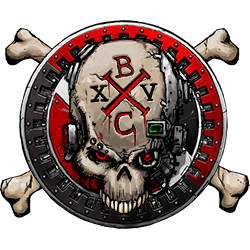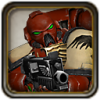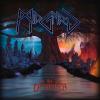Search the Community
Showing results for tags 'fiction'.
-
They lurched forward in waves, unnatural and rancid figures, resembling Space Marines but their countenances blighted and sullied with the stench of decay. Murky swarms of flies churned around them as they shuffled along on deformed limbs. Their rusted armor was greasy with the mucus that oozed from pocked carapaces bestrewn with sores. They held oxidized, grime-coated weapons in arms disfigured by foul disease. Despite their decomposing demeanors, these disgusting parodies of Space Marines were still formidable enemies. Wherever their weapons hit, men fell screaming, dark strains of crippling sickness spreading through their bodies. Weapons barely even fazed them, blasts and bolts absorbed into gnarled fusions of tissue and ceramite plate. Although the Guardsmen outnumbered them many times over, nothing seemed to interrupt the lethargic, scattered march of the Plague Marines. A discordant symphony of piercing shrieks, guttural death-rattles and the buzzing of warp-spawned pests followed them. Lieutenant Selwyn Barras cursed the day he had ever set foot on Ephesos. His regiment had come to the feudal world in response to bombastic claims that the dead were rising and slaughtering the human population. Barras’ superiors had put down the preliminary reports to the superstitious hysteria of barely-civilized serfs toiling in dark lowlands, growing meager rice in paddy fields. Following their deployment, however, regimental commanders soon assessed the blunt reality. Epidemics had ravaged Ephesos for months, but rather than alerting Terra to the outbreaks, the planetary governor had remained doggedly focused on ensuring that the world supplied its regular tithe of rice bushels to the Imperium. The governor and his staff had been the only ones off-planet to know about the hastily-dug mass graves containing the hundreds of thousands of peasants claimed by the spreading pestilence. They had broken their silence only when reanimated corpses had clambered out of their crude, shared tombs, ravaging all living things lucklessly in their paths. Fortunately, the mindless undead could not hope to match the exceptional training and veteran leadership of an Imperial Guard regiment. Rot rendered once-human bodies into soft meat easily torn apart by laser fire. Defeating the zombie hordes had proved more time-consuming than challenging, and in a matter of weeks, most of Ephesos’ key cities had been reclaimed by the Astra Militarum. Nature had not borne the plagues, nor their horrific creations. Unbeknownst to everyone, a Death Guard warband had instigated it all, and they were none too pleased at the disruption of their plans. They had attacked overnight, hobbling across the horizon. Regimental headquarters had instructed Barras to defend a dilapidated fortification along a stone wall running from a great river to a small inlet of a distant sea. The primitive masons who had constructed the barricade, with their highly limited knowledge of the universe in which they lived, would never have fathomed that the bulwark would someday be a citadel for the Imperial Guard against infernal demi-gods. “Not much we can do without plasma weapons, much less armored support,” Barras murmured to himself, chewing on his lower lip. He let out a troubled sigh. Commissar Aelia Tremelle, an ever-present face on the frontlines, could read the concern on Barras’ face as they observed the Plague Marines easily routing the forward positions. “The Emperor protects!” she yelled over the din of battle. What Tremelle lacked in persuasion she made up for in force of will. She was an ardent believer in the Imperium, and it was not hard to share her certainty, to emulate her zeal and unquestioning loyalty. Usually when Barras spied Tremelle’s peaked hat and fancily decorated coat, it bolstered his morale, reminded him that the all-powerful God-Emperor safeguarded humanity, against enemies both material and immaterial. This time was different. He reckoned by morning it was more probable he and the rest of the unit would be host to maggots rather than Tremelle’s unflappable passion. He buried his pessimism, though, knowing he could not risk revealing it. Tremelle would have used it as an excuse for a summary execution, but Barras did not fear his own death. He was more afraid that his despair would dishearten the rank-and-file, the men and women who depended on him for strength and guidance. Tremelle inspired them with moral purity, but it was from Barras they looked for leadership. If they saw him wavering, giving in to doubt and fear, they would resign themselves to annihilation. It was unlikely they could win against heretic Astartes, of course, but victory was not the goal now. Their objective was to offer the strongest resistance they could muster, to not give a single inch freely to the approaching traitors and their Chaos overlords. He grabbed the Aquila necklace he wore and pressed it against his lips. Readying his bolt pistol, he turned from Tremelle to face the soldiers who had fixed their wide eyes upon him, their las-rifles primed. His heart thudded in his chest in anticipation as he searched for the words. “Have no fear! We will never surrender! We fight for humanity and the Emperor! All of you: die standing! Be ready to greet the Emperor with pride!” Tremelle cheered first as he finished, a booming hurrah, which the enlisted ranks copied with raucous shouting of their own. The speech, as brief as it was, had done its job. Barras aimed toward the Plague Marines and fired. Lasers flashed past him, hitting their targets with great accuracy, but with minimal effect. The Death Guard traitors kept up their relentless march, cascades of shells spewing from their filth-encrusted weapons. Beside him, the side of Tremelle’s head exploded outward in a gory mess. Her corpse toppled over in the same direction seconds later. A determined Guardsman took her place. Tremelle had often spoke of her demise in hallowed, sacred terms, promising it would be a noble sacrifice. In truth, Barras saw nothing poetic or dignified about it. Instead, he wished that he would meet his death as quickly and unexpectedly as she had. “Look!” Barras swung his head around and saw a trooper pointing heavenward. Following the upturned finger with his eyes, Barras noticed a trail of fire blazing across the sky. It looked as though a meteor storm had suddenly broken out over Ephesos, another ominous omen to go along with the dead rising and demonic corruption. He could not long take his gaze away from the oncoming scourge; their drumming bolters would not permit them to be ignored. Each concussive shot that landed sent dirt, blood and viscera flying. It took every ounce of willpower to take decent aim and fire, and every fiber of his courage not to lose his nerve when he saw a Plague Marine disregard the shot when it landed. The only weapon he possessed which was serving its function was his faith, for it was that alone that kept him rigid to where he stood. Providence appeared to reward that faith. As the apparent meteoroids drew nearer, gaining ever more spectacular speed, it became clear they were something else entirely. They were drop pods of the Adeptus Astartes, and with ear-popping booms they plunged into the earth to the west of Barras’ position. Rocks and rubble sailed high in the air. Almost immediately pod doors whisked open, releasing their enormous occupants. The head of every soldier in Barras’ unit, the lieutenant himself included, had turned to gawk at the Space Marines in awe. In their power armor, they stood just over eight feet tall. To call them colossuses would barely do them justice. Despite looking like the figures of men, they were nevertheless alien and threatening, exuding auras of overwhelming violence. Their faces were hidden behind their helms, muzzle-mouthed and skull-faced, with piercing red lenses. Their armor was a pale tone of gray with yellow trim, and on their left pauldron a red scorpion raised its stinger menacingly against a white circle. In fluid motions, they smacked their bulky gauntlets on the stone eagle emblazoned over their breastplates before breaking out into sprints toward the Plague Marines. It seemed absurd that giants could move with such amazing celerity. Barras’ eyes were fixed on the goliath leading the charge. While his brothers mostly fired bolters, he carried a two-handed maul with two heads, each swathed in a powerful disruptor field. Letting out a growl that sounded distorted and harsh through his helmet speakers, the Marine swung his gigantic hammer and pounded an unsteady Plague Marine square in the chest. The sparking force field around the hammer’s head flashed on impact, amplifying the already inhuman strike to insane levels of strength. The Plague Marine flew backwards, landing and skidding around twenty yards away. Not dwelling on what he had just done, the maul-wielding Marine shouted to his comrades: “Let free the retribution of the Emperor, my brothers! Purge the unclean!” Unbelievably, the fallen Plague Marine rose again, a crater on his chest, dazed but not nearly incapacitated. It took a few more steps before being engulfed in a searing fireball. Many of the Marines wearing the scorpion heraldry carried flamers, and were using them liberally to submerge their Death Guard foes in infernos. The consuming blazes did little to dismay their shambling targets, and most of the Plague Marines continued firing their bolters and swinging their blades even as the flames scorched their armor and burned away their fetid flesh. Rather than seek their survival, they seemed to welcome death once it was credibly offered to them, as if it were some cherished gift. One of Barras’ soldiers let out a whoop of deliverance, sparking a chorus of additional supportive yells. With renewed dynamism, the Guardsmen resumed firing volleys, even if it was a weak supplement to the strength and firepower of the Adeptus Astartes. A small quantity of Plague Marines had died, but more were gradually closing in on their newly arrived attackers. Methodical salvos of bolter, flamer and plasma fire from the loyalist Marines thrashed the ranks of the Death Guard warband, but few were stopped, and eventually the two forces met. A helmetless heretic, his head resembling a moldering shriveled prune, grappled with the Space Marine commander, a humming chainsword gripped in one tremendous fist. His dark moss-colored armor seemed to leak with sludge. The Space Marine commander tried to shove him away, but his gauntlet slid clear due to the slimy gunk. The Death Guard warrior lunged, slashing his chainsword across the commander’s shoulder and blood sprayed through the split in the armor. The commander responded by slamming his elbow into his opponent’s belly and jumping backward, trouncing his maul onto neck and head. Like the rotted fruit it resembled, the Plague Marine’s head broke open, bone and brain obliterated in an eruption of filthy carnage. The decapitated body fell away as more enemies loomed. The scene became a festival of massacres, a carnival of blood and ferocity. A Space Marine fighting beside the commander died, an axe plunged into the space beneath his helm, and he fell to the sound of his own gurgling blood. Another Space Marine swept up his dead comrade’s bolt pistol and emptied the magazine into the killer. He was instantly set upon by a Plague Marine carrying a combat knife, which in Barras’ much smaller hands would easily have been a sword. The Chaos-corrupted Marine drove the serrated blade into the gap between breastplate and helmet before wrenching it out. He stabbed repeatedly, laughing with horrid glee, until the Space Marine collapsed. He was so caught up in his homicidal mania that he did not even notice the Astartes commander swinging his maul until it landed on his back, shattering his spine. The hammer rose and fell over and over, quickly turning the Plague Marine into a bludgeoned corpse. The battle was even, with the Space Marines winning slightly, but Barras wondered how long that would go on. The Death Guard Marines, though few in number, were only stoppable by extreme use of firepower or overwhelming brute force. In a conflict of pure attrition, the advantage lay with the nigh-invulnerable plague-bearing juggernauts. They were, Barras thought to himself, avatars of the inevitable entropy in the universe, the unpleasant but nevertheless harsh truth that all things, no matter how glorious or precious, would someday collapse and congeal, falling to ruin. Even the Imperium of Man, for all its splendors and righteousness, would at some point vanish from the universe, just as the brightest suns in the galaxy would fade into cold dark masses…. He was shaken from these heretical thoughts by the rumbling sound of Thunderhawks howling from behind him, their wing mounted guns blasting away. One by one, the Plague Marines exploded in a series of massive detonations. With almost stoic passivity, the more distant Death Guard survivors were torn apart by over-sized battle cannons spewing high-explosive rounds, others shredded by the shrapnel created by the rounds’ shell casings. The aircrafts banked around as they passed overhead, coming in low to the ground. When they landed, they unloaded streams of Space Marines, around twenty in each. From one, an enormous war machine strode clumsily down an exit ramp, roughly thirteen feet tall and just as wide. It moved in thumping, trifling steps, and its arms were weapons: the left was a steel arm capped by a wide chainsaw fist the size of an adult human, and the right was a long cannon with coils along its length that glowed dull blue. The battle ended soon thereafter. Barras’ men, exhausted and mortified by their brush with certain death, relaxed their discipline and slouched against the walls, some leaning on their firearms. Barras felt the urge to join them, but stopped when he spotted the Space Marine commander moving towards him. He snapped to attention, just as he had done years ago at the officers’ academy. He did his best to remain composed, but reflexively blanched at the noisy bluster of servos from the Marine’s armor joints. The Astartes had set aside his maul, and with gauntleted hands removed his helm. Underneath, his head was bald and leathery tan, marred with crisscrossed scars. His eyes were a light and watery blue, blank and unfocused. Barras smiled softly, hoping a relaxed and warm expression would obscure his nervousness before one of the God-Emperor’s chosen. Of course, he knew that was as futile as resisting an Inquisitor. “I’m Lieutenant Selywn Barras, my lord,” he began, “and we’re glad to see you…” “I am Brother-Captain Creon Mindarus,” the Astartes interrupted, “of the Red Scorpions’ Fourth Company. My orders are to purge this quadrant of the planet. Inquisitor Xanthus of the Ordo Malleus informed us that the traitors of the Fourteenth Legion were attempting to summon a powerful daemon, a harbinger of rot and ruin.” Barras nodded. “Well, it would appear your mission was accomplished.” “Not yet,” Creon said curtly. “Our orders were to cleanse this planet of Chaos taint, Lieutenant, and for us, that means all who were exposed to the corruption on Ephesos. Your unit has been deployed on the planet for several months, has it not?” Barras arched an eyebrow. “Y-Yes, my lord, to wipe out the walking dead…” “A task you did satisfactorily,” Creon replied with a cold monotone. “Yet, it was an error sending your regiment here. Despite its many commendations, you have one inherent flaw: you are mere humans.” He titled his head to one side briefly and clicked his tongue. “Well, most of you, at least. Your regiment has squads of abuhumans, yes?” “Y-You mean the Ogryns?” Barras stammered. “I have nothing to do with them!” The Astartes captain raised a hand to halt the protestations. “Your intentions are irrelevant. Even without the presence of abhumans, your regiment has been exposed to plagues and poxes your unmodified immune systems could not resist with guaranteed success. Rather than risk allowing you to leave Ephesos and potentially infect others, the chapter has decided to liquidate your regiment as part of our operations.” Barras went ashen as the blood drained from his face. His jaw dropped several centimeters and his eyes grew wide. “T-This is wrong! We did our duty!” “You did what was expected of you,” Creon responded with indifference. “Nevertheless, you cannot claim direct descent from the Emperor himself, as we can. Even few Astartes chapters truly do.” There was no pride on his lips; he spoke matter-of-factly. “You are flawed by your very nature, and thus, a liability. Your sacrifice serves the Imperium.” On instinct, Barras moved to run. Obviously the Astartes was faster. He reached out and clutched Barras’ neck in his gauntleted fingers. The Guardsman struggled in the grip, choking for air. Creon tightened his hold, crunching bone and cartilage with hardly a tensing of his muscles. Lifted off the ground, Barras’ feet kicked for solid contact, but soon went limp. The Astartes dropped him to the ground, where he fell with a thud. By this time, the worn and weakened soldiers of the unit had noticed the execution of their commander. As they processed what they were seeing, they also noticed that the charcoal-clad Space Marines had encircled them – and were now pointing their bolters, flamers, and plasma guns at them. Creon made a small motion with his hand and the Marines fired in unison, cutting down the surviving Guardsmen with ruthless efficiency. As lasers and flame reflected in his icy blue eyes, Creon whispered: “Purge the unclean.”
-
- fiction
- red scorpions
- (and 5 more)
-
Hey guys, As I started my Death Guard I got pretty sick... laid up in bed and I thought I'd slowly re read Dark Imperium. The first time I went through I whipped through it pretty quick upon release and it was definitely from an Ultra angle. I wanted to slow down and absorb the Death Guard aspect. Aside from the fact I tried to ignore it was at times geared towards a very young audience, I really liked how Death Guard gelled together until it got to the big three... Mort, Typhus and the Great Unclean dude. So here's my question... in all the Heresy novels it's almost repetitive that the Primarch comes off a little slow, and the first captain is usually the smart one, and naturally at odds with his Primarch. With Death Guard I did not think that was the case. But.... SPOILER ALERT: Right before the attack on Ultramar Typhus is chastising Mortarion claiming he is too late, and foolish for waiting for Guilliman to awaken. In fact Typhus makes it sounds like they could have wiped or at least put a very critical amount of damage on the '500' if they'd simply not waited so long to attack. This makes it feel like Mort has a personal vendetta... which I suppose is fine and it's usually why the good guys win. But beyond this first headscratcher the turmoil brewing between Typhus and Mortarion gets pretty bad. It seems Typhus accuses Mort of not fully accepting Nurgle into his life (like it's a cult or something). You get the sense Typhus wants Mort to feel second to him.... as in Typhus is the chosen of Nurgle, and Mort is just witness to all of his discoveries. Typhus also mentions discovering Nurgle first, and bringing it to Mort's attention. It's a weird scene and you're left with Mort feeling like he's got bigger problems on his own end then with Guiliman. I really don't understand it to be honest. Can anyone fill me in on this internal vendetta? They actually have a disdain that I think runs deeper than Ahriman and Magnus (though they seem to have buried the hatchet.)
- 30 replies
-
CONQUEROR Twisthammer – Book One It is the Thirty First Millennium, a time where heroes thrive and legends are born. Surging from humanity’s birthplace on Terra, the armies of the immortal Emperor of Mankind forge dominion over the galaxy after the anarchy of the Old Night. Long-lost worlds are brought back into the fold by force of diplomacy or arms, and alien oppressors are scattered to the winds and wiped from the pages of history. The Imperium of Man stands supreme over all who would threaten humanity. A million worlds celebrate the innumerable accomplishments of the new order. Great works of art and marvels of engineering are raised across the galaxy in honor of this glorious reunification. The many victories of the Emperor’s warriors bring peace and order to the worlds still emerging from the millennia-long dark age. Chief amongst these warriors are the Primarchs, twenty magnificent demigods created by the Emperor with the aid of arcane and forbidden technologies. Each Primarch leads a Legion of Space Marines, the pinnacle of humanity’s warriors made out of the Primarchs’ own genetic material. They are the most advanced and deadly warriors in humanity’s long history, and none could stand against them. Their names are legend, their deeds are million. The golden age of humanity dawns. But even amongst this august brotherhood, one warrior stands apart. He is Iskanderos, the Golden One, called the Conqueror and admired throughout the growing human dominion. He is the paragon of the species, general and strategist without peer, diplomat supreme who would bring about the Age of Mankind. He is the master of the Sixth Legion, the Imperial Redeemers, and humanity's best and brightest hope for transcendence. As echoes of the Old Night prepare to strike back, will he be humanity's deliverance or its damnation? -------------------------------- This is the opening novel in the Twisthammer series - a reimagining of the canon WH40K universe where the Primarchs are replaced with twenty original fan-made creations. Among other changes: the Great Crusade lasts for around 500 years, many Primarchs build their own pocket kingdoms within the Imperium, and these particular Primarchs are... a mixed bunch (read: most of them are not particularly nice). Note that all twenty Legions have been finished (IA entries on the below blog), though there is a lot of room in terms of developing rules, special characters, and imagery (as neither myself nor my collaborators are particularly talented with drawing/Photoshop). Additional information on Twisthammer can be found on the blog or in this thread
- 55 replies
-
- Alternate heresy
- Twisthammer
-
(and 1 more)
Tagged with:



